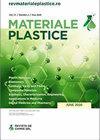Piezoelectric thin Film Composites with BaTiO3 for Microelectronics
IF 0.7
4区 材料科学
Q4 MATERIALS SCIENCE, MULTIDISCIPLINARY
引用次数: 0
Abstract
The piezocomposites from poly-(vinylidene fluoride) (PVDF) with BaTiO3 (BT) are largely presented in literature, but the composites from polydimethylsiloxane (PDMS) with BT consist a very new scientific preoccupation. The novelty of the paper lies in a new simpler route of preparation of the two composites with PDMS and respectively PVDF matrix, with tailored deposition on specific substrates for microelectronic use (e.g. indium-tin-oxide ITO/glass, Si/Pt, polyethylene terephthalate PET), along with an extensive comparation of their dielectric features, a consistent comparison of the influence of polymer matrix upon the piezoelectric features, and a demonstration of direct use for microelectronic applications of the composites of BT with PDMS. An interesting effect is observed around 100 kHz domain, determined by the activity and architecture of BT particles mainly for the BT-PDMS composites, which induce an additional ionic-dipolar conjugated polarization, as a displacement due to the balance between the resonance and anti-resonance frequency. Such phenomena explain the potential use of such composites as resonators/filters, and BT-PDMS composites should be further investigated for tailored applications in radiofrequency electronic field. We can appreciate that superior piezoelectric features are offered by the composites of BT with PDMS, comparing to the composites with PVDF, which means that the composites of BT with PDMS were worth to study, leading to more versatile variants of electronic characteristics and with superior values.用于微电子学的 BaTiO3 压电薄膜复合材料
聚偏二氟乙烯(PVDF)与钡钛氧化物(BT)的压电复合材料在文献中已有大量介绍,但聚二甲基硅氧烷(PDMS)与钡钛氧化物的复合材料还是一个非常新的科学课题。本文的新颖之处在于采用了一种新的更简单的方法制备这两种分别以 PDMS 和 PVDF 为基体的复合材料,并在微电子用途的特定基底(如氧化铟锡 ITO/玻璃、硅/铂、聚对苯二甲酸乙二醇酯 PET)上进行了定制沉积,同时对它们的介电特性进行了广泛的比较,对聚合物基体对压电特性的影响进行了一致的比较,并展示了 BT 与 PDMS 复合材料在微电子应用中的直接用途。在 BT-PDMS 复合材料中,主要由 BT 颗粒的活性和结构决定,在 100 kHz 域附近观察到一种有趣的效应,这种效应会诱发额外的离子-两极共轭极化,由于共振频率和反共振频率之间的平衡而产生位移。这些现象解释了此类复合材料作为谐振器/滤波器的潜在用途,因此应进一步研究 BT-PDMS 复合材料在射频电子领域的定制应用。我们可以发现,与使用 PVDF 的复合材料相比,使用 BT 和 PDMS 的复合材料具有更优越的压电特性,这意味着使用 BT 和 PDMS 的复合材料值得研究,它将带来更多的电子特性变体,并具有更高的价值。
本文章由计算机程序翻译,如有差异,请以英文原文为准。
求助全文
约1分钟内获得全文
求助全文
来源期刊

Materiale Plastice
MATERIALS SCIENCE, MULTIDISCIPLINARY-
CiteScore
1.40
自引率
25.00%
发文量
99
审稿时长
6-12 weeks
期刊介绍:
Materiale Plastice, abbreviated as Mater. Plast., publishes original scientific papers or guest reviews on topics of great interest.
The Journal does not publish memos, technical reports or non-original papers (that are a compiling of literature data) or papers that have been already published in other national or foreign Journal.
 求助内容:
求助内容: 应助结果提醒方式:
应助结果提醒方式:


